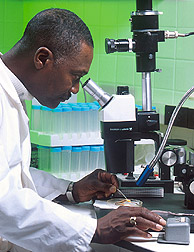Medical microbiology
Enlarge text Shrink textMedical microbiology, the large subset of microbiology that is applied to medicine, is a branch of medical science concerned with the prevention, diagnosis and treatment of infectious diseases. In addition, this field of science studies various clinical applications of microbes for the improvement of health. There are four kinds of microorganisms that cause infectious disease: bacteria, fungi, parasites and viruses, and one type of infectious protein called prion. A medical microbiologist studies the characteristics of pathogens, their modes of transmission, mechanisms of infection and growth. The academic qualification as a clinical/Medical Microbiologist in a hospital or medical research centre generally requires a Bachelors degree while in some countries a Masters in Microbiology along with Ph.D. in any of the life-sciences (Biochem, Micro, Biotech, Genetics, etc.). Medical microbiologists often serve as consultants for physicians, providing identification of pathogens and suggesting treatment options. Using this information, a treatment can be devised. Other tasks may include the identification of potential health risks to the community or monitoring the evolution of potentially virulent or resistant strains of microbes, educating the community and assisting in the design of health practices. They may also assist in preventing or controlling epidemics and outbreaks of disease. Not all medical microbiologists study microbial pathology; some study common, non-pathogenic species to determine whether their properties can be used to develop antibiotics or other treatment methods. Epidemiology, the study of the patterns, causes, and effects of health and disease conditions in populations, is an important part of medical microbiology, although the clinical aspect of the field primarily focuses on the presence and growth of microbial infections in individuals, their effects on the human body, and the methods of treating those infections. In this respect the entire field, as an applied science, can be conceptually subdivided into academic and clinical sub-specialties, although in reality there is a fluid continuum between public health microbiology and clinical microbiology, just as the state of the art in clinical laboratories depends on continual improvements in academic medicine and research laboratories.
Read more on Wikipedia >
 Topic
Topic





